politics and the english language 政治和英语语言 乔治奥威尔
Politics政治英孚英语资料
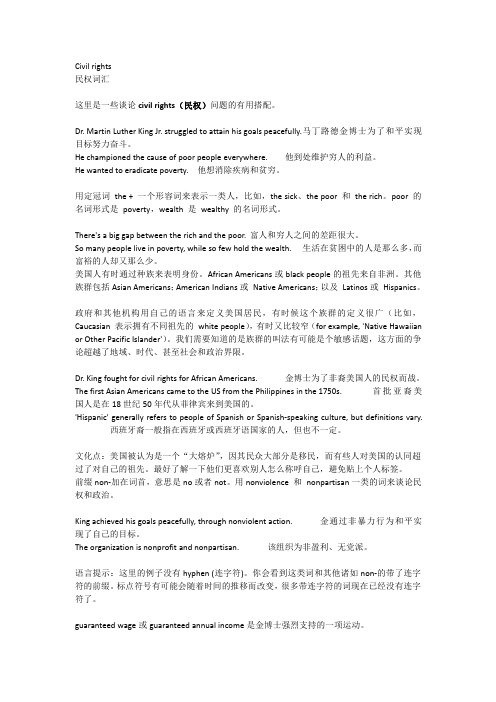
Civil rights民权词汇这里是一些谈论civil rights(民权)问题的有用搭配。
Dr.Martin Luther King Jr.struggled to attain his goals peacefully.马丁路德金博士为了和平实现目标努力奋斗。
He championed the cause of poor people everywhere.他到处维护穷人的利益。
He wanted to eradicate poverty.他想消除疾病和贫穷。
用定冠词the+一个形容词来表示一类人,比如,the sick、the poor和the rich。
poor的名词形式是poverty,wealth是wealthy的名词形式。
There's a big gap between the rich and the poor.富人和穷人之间的差距很大。
So many people live in poverty,while so few hold the wealth.生活在贫困中的人是那么多,而富裕的人却又那么少。
美国人有时通过种族来表明身份。
African Americans或black people的祖先来自非洲。
其他族群包括Asian Americans;American Indians或Native Americans;以及Latinos或Hispanics。
政府和其他机构用自己的语言来定义美国居民,有时候这个族群的定义很广(比如,Caucasian表示拥有不同祖先的white people),有时又比较窄(for example,'Native Hawaiian or Other Pacific Islander')。
我们需要知道的是族群的叫法有可能是个敏感话题,这方面的争论超越了地域、时代、甚至社会和政治界限。
Dr.King fought for civil rights for African Americans.金博士为了非裔美国人的民权而战。
各个学科名字的英文单词

各个学科名字的英文单词各个学科名字的英文单词每一门学科的名字都有属于它的英文单词,为此店铺为大家带来各个学科名字的英文单词。
学科名的英文单词Chinese 语文English 英语Japanese 日语history 历史mathematics 数学physical education 体育algebra 代数geometry 几何geography 地理biology 生物chemistry 化学physics 物理literature 文学psychology 心理学sociology 社会学philosophy 哲学engineering 工程学mechanical engineering 机械工程学electronics 电子学medicine 医学social science 社会学agriculture 农学astronomy 天文学economics 经济学politics 政治学biochemistry 生物化学anthropology 人类学linguistics 语言学accounting 会计学law 法学metallurgy 冶金学finance 财政学,金融学journalism 新闻学civil engineering 土木工程学architecture 建筑学business administration 工商管理学chemical engineering 化学工程学botany 植物学学科的英文例句计算机科学目前已是一门成熟的.学科。
Computer science is now a fully-fledged academic subject.他熟悉这一学科。
He is at home with this subject.她已全面掌握了这一学科。
She has a comprehensive grasp of the subject.但愿我能精通这门学科就好了。
政治学专业英语教程pdf
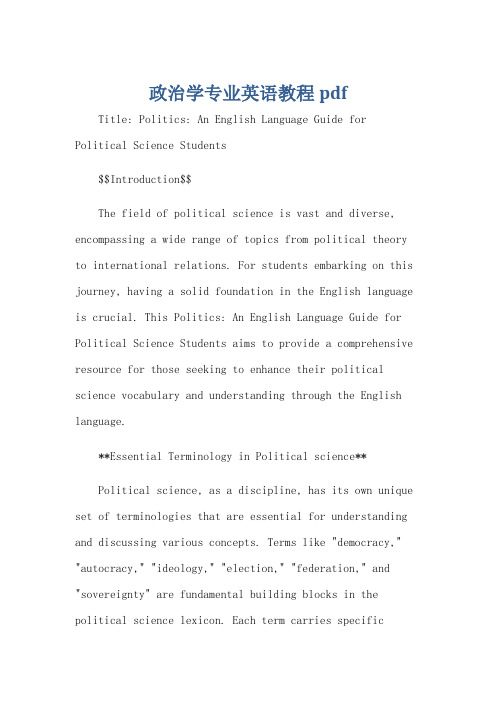
政治学专业英语教程pdfTitle: Politics: An English Language Guide forPolitical Science Students$$Introduction$$The field of political science is vast and diverse, encompassing a wide range of topics from political theory to international relations. For students embarking on this journey, having a solid foundation in the English language is crucial. This Politics: An English Language Guide for Political Science Students aims to provide a comprehensive resource for those seeking to enhance their political science vocabulary and understanding through the English language.**Essential Terminology in Political science**Political science, as a discipline, has its own unique set of terminologies that are essential for understanding and discussing various concepts. Terms like "democracy," "autocracy," "ideology," "election," "federation," and "sovereignty" are fundamental building blocks in the political science lexicon. Each term carries specificmeanings and nuances that are critical for accurate communication and analysis.**Reading Comprehension in Political Texts**Reading comprehension is a cornerstone skill inpolitical science. Political texts, whether they are academic articles, political manifestos, or legal documents, often contain dense and complex language. To effectively navigate these texts, students need to develop strong reading comprehension skills. This includes the ability to identify key arguments, understand complex sentences, and interpret implicit meanings.**Writing Skills for Political Analysis**Writing is an integral part of political science, as it allows students to articulate their ideas, analyzepolitical events, and formulate arguments. To excel in political writing, students should master the basics of essay writing, including structuring arguments, using evidence to support claims, and employing clear and concise language. Additionally, they should familiarize themselves with the conventions of academic writing, such as citing sources and adhering to formatting guidelines.**Listening and Speaking Skills in Political Discussions**In the realm of political science, listening and speaking skills are paramount. Political discussions often involve diverse viewpoints and lively debates. To participate effectively in these discussions, students must be able to listen attentively, understand different perspectives, and articulate their own opinions clearly and coherently. They should also develop the ability to engage in critical discussions, asking probing questions and offering well-reasoned responses.**Cultural Sensitivity and Cross-Cultural Communication**Political science is a global discipline that often intersects with different cultures and contexts. Therefore, cultural sensitivity and cross-cultural communicationskills are essential for political science students. Understanding the political systems, values, and traditions of other cultures allows for a more nuanced and informed analysis of political events and phenomena. Additionally, being able to communicate effectively with people fromdiverse backgrounds is crucial in international relations and global politics.**Conclusion**In conclusion, this Politics: An English Language Guide for Political Science Students provides a comprehensive overview of the essential English language skills required for studying political science. By enhancing their vocabulary, reading comprehension, writing skills,listening and speaking abilities, and cultural sensitivity, students will be well-prepared to navigate the complexities of the political science landscape. As they continue to develop their understanding and expertise in this fascinating field, they will be able to contribute to informed discussions and analysis of political issues both locally and globally.This guide serves as a starting point for political science students who want to strengthen their English language proficiency. However, it is important to note that language learning is a continuous process, and students should continue to explore and practice various language skills throughout their academic journey. With dedicationand effort, they will be able to master the English language and excel in the field of political science.。
Politics and the English Language政治与英语
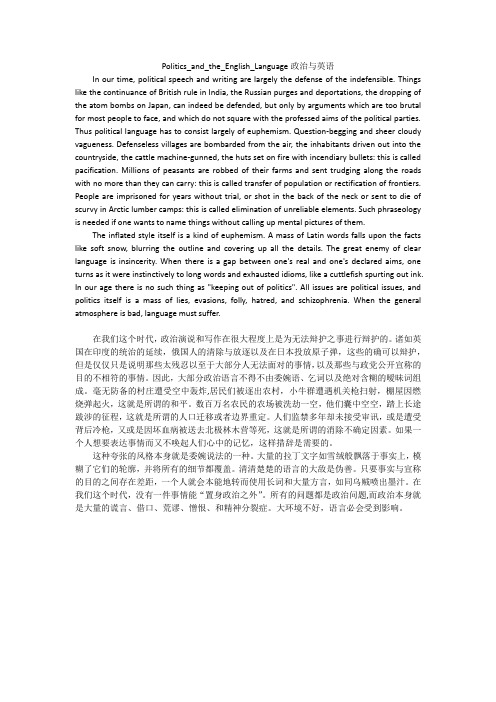
Politics_and_the_English_Language政治与英语In our time, political speech and writing are largely the defense of the indefensible. Things like the continuance of British rule in India, the Russian purges and deportations, the dropping of the atom bombs on Japan, can indeed be defended, but only by arguments which are too brutal for most people to face, and which do not square with the professed aims of the political parties. Thus political language has to consist largely of euphemism. Question-begging and sheer cloudy vagueness. Defenseless villages are bombarded from the air, the inhabitants driven out into the countryside, the cattle machine-gunned, the huts set on fire with incendiary bullets: this is called pacification. Millions of peasants are robbed of their farms and sent trudging along the roads with no more than they can carry: this is called transfer of population or rectification of frontiers. People are imprisoned for years without trial, or shot in the back of the neck or sent to die of scurvy in Arctic lumber camps: this is called elimination of unreliable elements. Such phraseology is needed if one wants to name things without calling up mental pictures of them.The inflated style itself is a kind of euphemism. A mass of Latin words falls upon the facts like soft snow, blurring the outline and covering up all the details. The great enemy of clear language is insincerity. When there is a gap between one's real and one's declared aims, one turns as it were instinctively to long words and exhausted idioms, like a cuttlefish spurting out ink. In our age there is no such thing as "keeping out of politics". All issues are political issues, and politics itself is a mass of lies, evasions, folly, hatred, and schizophrenia. When the general atmosphere is bad, language must suffer.在我们这个时代,政治演说和写作在很大程度上是为无法辩护之事进行辩护的。
Unit 4 Politics_ Class and Race (英国的政治_阶级和种族)
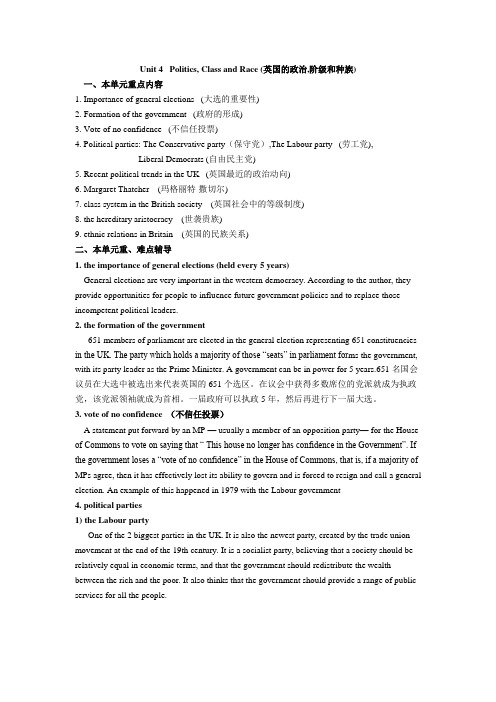
Unit 4 Politics, Class and Race (英国的政治,阶级和种族)一、本单元重点内容1. Importance of general elections (大选的重要性)2. Formation of the government (政府的形成)3. Vote of no confidence (不信任投票)4. Political parties: The Conservative party(保守党),The Labour party (劳工党),Liberal Democrats (自由民主党)5. Recent political trends in the UK (英国最近的政治动向)6. Margaret Thatcher (玛格丽特·撒切尔)7. class system in the British society (英国社会中的等级制度)8. the hereditary aristocracy (世袭贵族)9. ethnic relations in Britain (英国的民族关系)二、本单元重、难点辅导1. the importance of general elections (held every 5 years)General elections are very important in the western democracy. According to the author, they provide opportunities for people to influence future government policies and to replace those incompetent political leaders.2. the formation of the government651 members of parliament are elected in the general election representing 651 constituencies in the UK. The party which holds a majority of those “seats” in parliament for ms the government, with its party leader as the Prime Minister. A government can be in power for 5 years.651名国会议员在大选中被选出来代表英国的651个选区。
关于高中语文、数学、英语、历史、地理和政治六门学科的语录
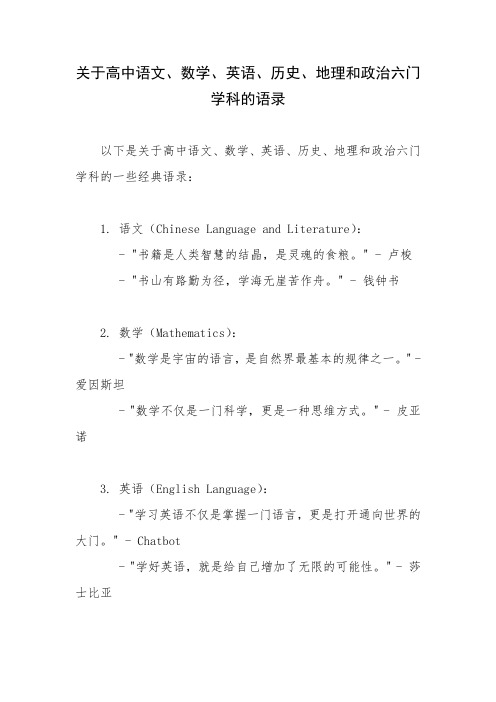
关于高中语文、数学、英语、历史、地理和政治六门学科的语录以下是关于高中语文、数学、英语、历史、地理和政治六门学科的一些经典语录:1. 语文(Chinese Language and Literature):- "书籍是人类智慧的结晶,是灵魂的食粮。
" - 卢梭- "书山有路勤为径,学海无崖苦作舟。
" - 钱钟书2. 数学(Mathematics):- "数学是宇宙的语言,是自然界最基本的规律之一。
" - 爱因斯坦- "数学不仅是一门科学,更是一种思维方式。
" - 皮亚诺3. 英语(English Language):- "学习英语不仅是掌握一门语言,更是打开通向世界的大门。
" - Chatbot- "学好英语,就是给自己增加了无限的可能性。
" - 莎士比亚4. 历史(History):- "研究历史可以让我们更好地认识过去,从而更好地理解现在和未来。
" - 爱德华·吉本- "历史是人类的镜子,通过研究历史,我们能看到自己的影子。
" - 雷锋5. 地理(Geography):- "地理是研究地球和人类在地球上分布、相互关系的科学。
" - Chatbot- "地理告诉我们不同地区的环境、资源和文化,帮助我们更好地了解世界。
" - 弗兰西斯·培根6. 政治(Politics):- "政治影响着每个人的生活,参与政治可以改变世界。
" - 尼尔斯·玻尔- "政治不仅仅是权力和斗争,也是为了实现社会正义和共同利益。
" - 马丁·路德·金这些语录试图概括每门学科的重要性和意义,鼓励对学习和探索的热情。
希望它们能够激励你在学习过程中取得成功!。
国际政治专业英语要求
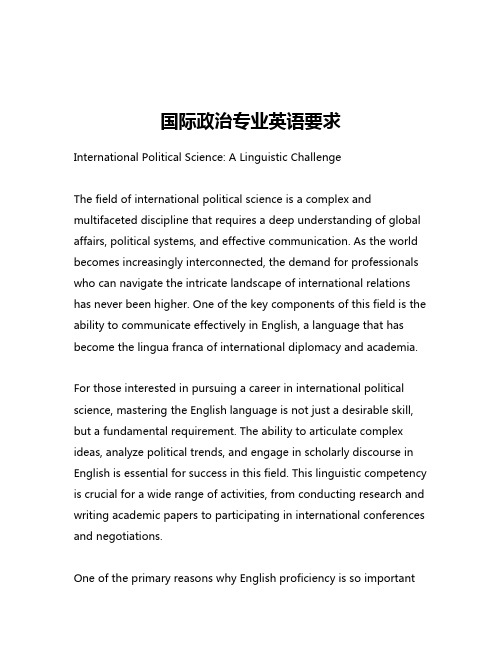
国际政治专业英语要求International Political Science: A Linguistic ChallengeThe field of international political science is a complex and multifaceted discipline that requires a deep understanding of global affairs, political systems, and effective communication. As the world becomes increasingly interconnected, the demand for professionals who can navigate the intricate landscape of international relations has never been higher. One of the key components of this field is the ability to communicate effectively in English, a language that has become the lingua franca of international diplomacy and academia.For those interested in pursuing a career in international political science, mastering the English language is not just a desirable skill, but a fundamental requirement. The ability to articulate complex ideas, analyze political trends, and engage in scholarly discourse in English is essential for success in this field. This linguistic competency is crucial for a wide range of activities, from conducting research and writing academic papers to participating in international conferences and negotiations.One of the primary reasons why English proficiency is so importantin international political science is the global nature of the field. Political events and decisions made in one part of the world can have far-reaching consequences on a global scale. Effective communication in English allows scholars, policymakers, and diplomats to share ideas, exchange information, and collaborate on solutions to pressing international issues. Without a common language, the exchange of knowledge and the coordination of global efforts would be significantly hindered.Moreover, the language of international political science is often highly specialized, incorporating technical terms, acronyms, and concepts that are specific to the field. Mastering this specialized vocabulary and the ability to use it accurately and fluently is crucial for academics and professionals in the field. Whether it's discussing the nuances of international organizations, analyzing geopolitical strategies, or debating the merits of different economic policies, the ability to communicate effectively in English is essential.In addition to the practical necessity of English proficiency, the study of international political science also requires a deep understanding of cultural and linguistic diversity. Effective international cooperation and diplomacy often hinge on the ability to navigate and respect different cultural norms, social customs, and communication styles. By developing a strong command of the English language, students and professionals in this field can better understand and engage withindividuals and institutions from around the world, fostering a more inclusive and effective global dialogue.Furthermore, the pursuit of international political science often involves extensive research, analysis, and academic writing. The ability to read, comprehend, and critically evaluate a wide range of English-language sources, from journal articles to government reports, is crucial for building a solid foundation of knowledge and contributing to the scholarly discourse in the field. Equally important is the ability to present research findings and ideas clearly and persuasively in written English, whether in the form of research papers, policy briefs, or academic publications.In conclusion, the requirement for English proficiency in the field of international political science is a reflection of the global nature of the discipline and the need for effective communication across borders. By developing a strong command of the English language, students and professionals in this field can enhance their ability to participate in the global exchange of ideas, collaborate on international initiatives, and contribute to the advancement of knowledge and understanding in this dynamic and ever-evolving field.。
politics and the english language学习任务答案与篇章讲解赏析

.
Orwell 认为现代英语存在哪些问题?
Orwell 认为现代英语存在诸多问题,如词汇和短语的滥用、词汇的含义模糊、语
言的庸俗化等,这些问题导致语言的质量下降,也影响着人们对政治问题的理解 和判断。
.
ห้องสมุดไป่ตู้
Orwell 提出了哪些改善语言的建议?
Orwell 提出了一系列改善语言的建议,如避免使用空洞的词汇和短语、避免使用
学习任务答案:
.
George Orwell 写了哪本书?
George Orwell 写了《Politics and the English Language》一文。
.
Orwell 认为语言和政治之间有何关系?
Orwell 认为语言和政治密切相关,语言的质量直接影响着人们对政治问题的认识 和理解,政治话语的滥用和虚假使用也会导致语言的腐败和退化。
总的来说,《Politics and the English Language》是一篇富有思想性和洞见性的
文章,它在揭示语言和政治之间的关系和探讨语言质量的问题方面具有重要的价
值。它不仅是一篇关于英语写作的经典之作,也是一篇关于政治文化的经典之作, 它的影响不仅限于英语世界,也深刻地影响了世界各地的文化和政治发展。
过度的修辞和虚假的比喻、精确地表达意思等,这些建议可以提高语言的质量, 增强人们对政治问题的理解和判断能力。 篇章讲解赏析:
《Politics and the English Language》是乔治·奥威尔在 1946 年发表的一篇文章,
旨在探讨语言和政治之间的关系,并提出一些改善英语语言的建议。这篇文章不 仅影响了英语写作的标准,也对现代政治和文化的发展产生了深远的影响。 文章首先指出现代英语存在的问题,如词汇的滥用和含义模糊、语言的庸俗化和 空洞化等,这些问题导致语言的质量下降,也使人们对政治问题的理解和判断能 力下降。接着,奥威尔提出了一些改善语言的建议,如精确地表达意思、避免使 用过度的修辞和虚假的比喻、避免使用空洞的词汇和短语等。这些建议不仅有助 于提高语言的质量,也有助于增强人们对政治问题的理解和判断能力。 奥威尔在文章中还提到政治话语的虚假使用和滥用,指出这种现象对语言的质量 和政治的健康发展造成了严重的影响。他认为了更好地阐述这一观点,奥威尔在 文章中列举了一些政治话语的例子,并分析了这些话语背后的真正含义和目的。 他指出,这些话语往往是通过混淆概念、转移话题和误导读者来掩盖真相和维护 权力的手段,而这种手段的使用会进一步破坏语言的质量和政治的公正性。 在文章的结尾,奥威尔再次强调了语言和政治之间的密切关系,指出语言的质量 和政治的健康发展密不可分。他呼吁人们要遵循准确、简洁和清晰的语言规范, 这样才能有效地反对语言的腐败和政治的腐败,保护言论自由和民主价值。
politics中英对照时政翻译

Joint China-US Statement on Climate Change 中美气候联合声明英语翻译111班潘欣艳5102611004The United States of America and the People's Republic of China recognize that the increasing dangers presented by climate change measured against the inadequacy of the global response requires a more focused and urgent initiative. The two sides have been engaged in constructive discussions through various channels over several years bilaterally and multilaterally, including the UN Framework Convention on Climate Change process and the Major Economies Forum. In addition, both sides consider that the overwhelming scientific consensus regarding climate change constitutes a compelling call to action crucial to having a global impact on climate change.中华人民共和国和美利坚合众国认识到,就气候变化带来的日益加剧的危害和全球应对的不足比较而言,我们现今需要一个更具针对性的紧急倡议。
过去几年里,双方通过双边和多边渠道,包括在联合国气候变化框架公约进程和经济大国论坛下,一直进行着建设性的讨论。
中西文明选读(英文版)第1章 Politics

【1.1 Politics of the United States of America】 【美国的政治】
1.1.1 Politics of the United States
The executive branch is headed by the President and is independent of the legislature. Legislative power is vested in the two chambers of Congress, the Senate and the House of Representatives. The judicial branch (or judiciary), composed of the Supreme Court and lower federal courts, exercises judiche judiciary’s function is to interpret the United States Constitution and federal laws and regulations. This includes resolving disputes between the executive and legislative branches. The federal government’s layout is explained in the Constitution. Two political parties, the Democratic Party and the Republican Party, have dominated American politics since the American Civil War, although other parties have also existed.
英语长文经典带翻译

英语长文经典带翻译Title: Classic English Long Essay with Translation。
As the world becomes more globalized, the importance of English as a universal language has become increasingly evident. For those seeking to improve their English skills, reading classic English long essays can be a great way to expand vocabulary, improve grammar, and gain insight into the culture and history of English-speaking countries. In this article, we will provide a selection of classic English long essays along with translations, so that readers can fully understand and appreciate the content.1. "Of Studies" by Francis Bacon。
Bacon's essay on the value of education and learning is a timeless classic. In it, he argues that reading, writing, and learning are essential for a well-rounded and successful life. He also emphasizes the importance of balancing intellectual pursuits with practical skills andphysical exercise."读书,写作,学习是人生必不可少的。
社会学【政治与国家】 中英
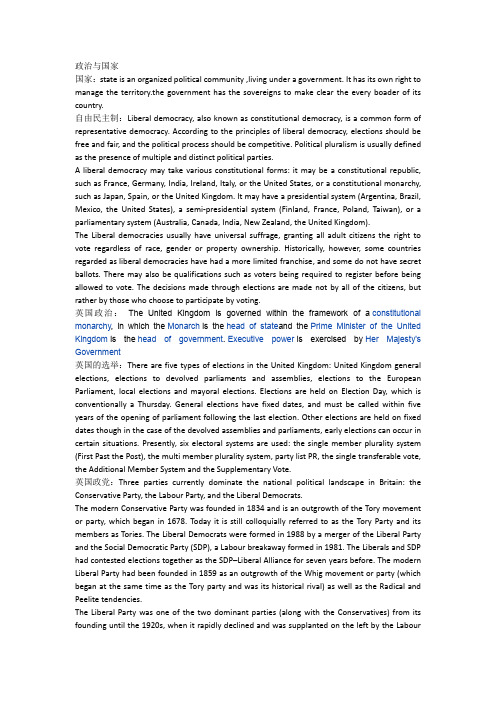
英国的选举:There are five types of elections in the United Kingdom: United Kingdom general elections, elections to devolved parliaments and assemblies, elections to the European Parliament, local elections and mayoral elections. Elections are held on Election Day, which is conventionally a Thursday. General elections have fixed dates, and must be called within five years of the opening of parliament following the last election. Other elections are held on fixed dates though in the case of the devolved assemblies and parliaments, early elections can occur in certain situations. Presently, six electoral systems are used: the single member plurality system (First Past the Post), the multi member plurality system, party list PR, the single transferable vote, the Additional Member System and the Supplementary Vote. 英国政党:Three parties currently dominate the national political landscape in Britain: the Conservative Party, the Labour Party, and the Liberal Democrats. The modern Conservative Party was founded in 1834 and is an outgrowth of the Tory movement or party, which began in 1678. Today it is still colloquially referred to as the Tory Party and its members as Tories. The Liberal Democrats were formed in 1988 by a merger of the Liberal Party and the Social Democratic Party (SDP), a Labour breakaway formed in 1981. The Liberals and SDP had contested elections together as the SDP–Liberal Alliance for seven years before. The modern Liberal Party had been founded in 1859 as an outgrowth of the Whig movement or party (which began at the same time as the Tory party and was its historical rival) as well as the Radical and Peelite tendencies. The Liberal Party was one of the two dominant parties (along with the Conservatives) from its founding until the 1920s, when it rapidly declined and was supplanted on the left by the Labour
新视野大学英语第三版读写教程第四册课后翻译

第一单元一、英译汉Aristotle was an ancient Greek philosopher and scientist.亚里士多德是古希腊的哲学家和科学家。
His writings cover many subjects, including physics, biology, zoology, logic, ethics, poetry, theater, music, linguistics, politics and government, and constitute the first comprehensive system of Western philosophy.他的作品涵盖了许多学科,包括物理学、生物学、动物学、逻辑学、伦理学、诗歌、戏剧、音乐、语言学、政治和政府,构成了第一个综合的西方哲学体系。
Aristotle was the first to classify areas of human knowledge into distinct disciplines such as mathematics, biology, and ethics.亚里士多德是第一个将人类的知识领域划分为不同学科的人,如数学,生物学和伦理学。
He believed all people's concepts and all their knowledge were ultimately based on perception.他相信人所有的观念和所有的知识在根本上都是基于感知能力。
His views on natural sciences laid the groundwork for many of his works.他对自然科学的看法构成了他许多作品的基础。
He contributed to almost every field of human knowledge in his era.他几乎对他所处时期的每一个人类知识领域都作出了贡献。
英语成为国际语言的原因英语作文
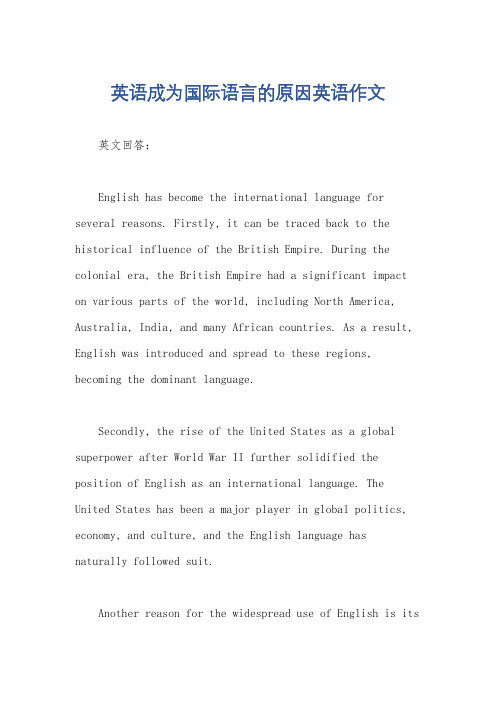
英语成为国际语言的原因英语作文英文回答:English has become the international language for several reasons. Firstly, it can be traced back to the historical influence of the British Empire. During the colonial era, the British Empire had a significant impact on various parts of the world, including North America, Australia, India, and many African countries. As a result, English was introduced and spread to these regions, becoming the dominant language.Secondly, the rise of the United States as a global superpower after World War II further solidified the position of English as an international language. The United States has been a major player in global politics, economy, and culture, and the English language hasnaturally followed suit.Another reason for the widespread use of English is itspracticality and accessibility. English is relatively easy to learn compared to other languages, and it has a simple grammar structure. Moreover, English is widely used in various fields such as business, science, technology, and tourism. Many international organizations, conferences, and academic publications are conducted in English, making it essential for individuals to have a good command of the language in order to participate and succeed in these domains.Furthermore, the influence of popular culture, particularly American movies, music, and television shows, has contributed to the global popularity of English. The entertainment industry has a significant impact on people's lives, and the English language is often associated with the glamour and success portrayed in these media. This has led to a desire for many individuals around the world to learn English in order to be part of this global cultural phenomenon.In conclusion, the historical influence of the British Empire, the rise of the United States as a globalsuperpower, the practicality and accessibility of English, and the influence of popular culture have all contributedto the status of English as the international language.中文回答:英语成为国际语言有几个原因。
政治学与行政学专业英语词汇
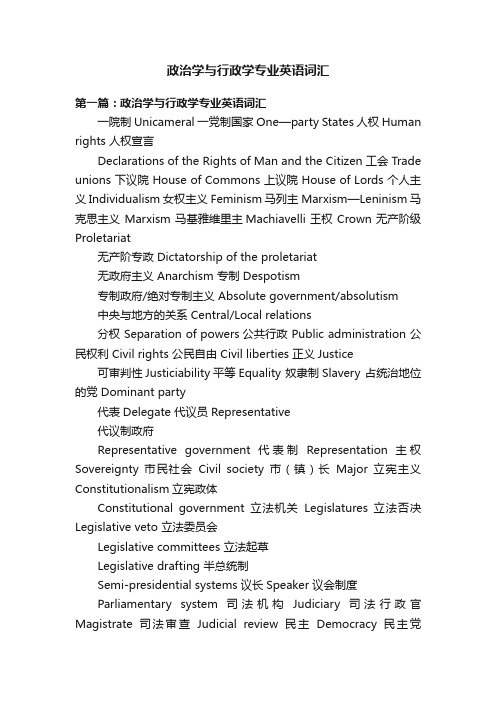
政治学与行政学专业英语词汇第一篇:政治学与行政学专业英语词汇一院制 Unicameral 一党制国家 One—party States 人权 Human rights 人权宣言Declarations of the Rights of Man and the Citizen 工会 Trade unions 下议院 House of Commons 上议院 House of Lords 个人主义 Individualism 女权主义 Feminism 马列主Marxism—Leninism 马克思主义 Marxism 马基雅维里主Machiavelli 王权 Crown 无产阶级Proletariat无产阶专政 Dictatorship of the proletariat无政府主义 Anarchism 专制 Despotism专制政府/绝对专制主义 Absolute government/absolutism中央与地方的关系 Central/Local relations分权 Separation of powers公共行政 Public administration 公民权利 Civil rights 公民自由 Civil liberties 正义Justice可审判性Justiciability平等Equality 奴隶制Slavery 占统治地位的党 Dominant party代表Delegate 代议员Representative代议制政府Representative government 代表制Representation 主权Sovereignty 市民社会Civil society 市(镇)长Major 立宪主义Constitutionalism立宪政体Constitutional government 立法机关Legislatures 立法否决Legislative veto 立法委员会Legislative committees 立法起草Legislative drafting 半总统制Semi-presidential systems 议长Speaker 议会制度Parliamentary system 司法机构Judiciary 司法行政官Magistrate 司法审查Judicial review 民主Democracy 民主党Democratic Party 民主集中制Democraticcentralism 民意测验Opinion polls 共产党Communist Parties共和国Republic 机构/制度Institution 权力Power 权利Rights权利法案Bill of rights 权威Authority 妇女选举权Women’s suffrage 地方长官Prefect地方政府Local government 地方政府财政Local government finance 地方政治Local politics 同意Consent同意投票Approval voting团体理论Group theory 邦联Confederation邦联条例Articles of Confederation 自由Freedom 自由党Liberal parties 自由裁量权Discretion 自决Self-determination 自治Self-government 自治领Dominion 行为主义Behaviouralism 行政Administration 行政机关Executives 政委员Administrative board 行政法庭Administrative tribunal 行政法院Administrative court 州长Governor 多元主义Pluralism 多元社会Plural society 多头制Polyarchy 多数派政府Majority government 多数统治Majority rule 决策Decision making 决策理论Decision theory 农奴制Serfdom 阶层/阶级Class 麦迪逊,詹姆斯Madison,James 苏格拉底Socrates 极权主义Totalitarianism 否决权Veto投票Voting 投票率Turnout 护宪Entrenchment 财产权Property 利益Interests 利益表达与聚合Interest articulation and aggregation 利益集团Interest group言论,表达和出版自由Freedom of speech,expression,and the press 社区/共同体Community 社团主义Corporatism 社会主义Socialism 社会民主主义 Social democracy社会契约论Social contract君主制Monarchy 责任Responsibility 责任政府Responsible government直接民主Direct democracy直接行动Direct action杰斐逊,托马斯Jefferson,Thomas 欧洲议会European Parliament 欧洲共同体European Community 歧视Discrimination 国际法International Law 国家State国家元首Head of state 国家消亡Withering away of the state 国家财政危机 Fiscal crisis of the state 非暴力反抗 Civil disobedience 非暴力行为Non-violent action 制定法Statute Law 制衡Checks and balance 委任Patronage 委员会Commission 质询Interpellation 法Law 法令Act 法官Judge 法治Rule of law 法律的正当程序Due process of law 法案,议案Bill 宗教自由Freedom of religion 审判Adjudication 审查制度Censorship 官僚制/官僚Bureaucracy 实证主义Positivism 封建主义Feudalism 革命和反革命Revolution and counter-revolution 政体Polity 政纲platform 政变Coup D’etat 政府Government 政府组成过程Government formation process 政府首脑Head of government 政府调查Public inquiry 政治Politics 政治义务Political obligation政治文化Political culture 政治中的种族问题 Race in politics政治心理学 Political psychology 政治发展Political development政治行动委员会(美国)Political action committee 政治行为研究Political behaviour 政治地理学Political geography 政治权力Political power政治局(及常务委员会)Politburo(and Pesidium)政治沟通Political communication 政治体系/政治系统 Political system 政治参与Political participation 政治财政Political finance 政治科学Political science 政治社会化Political socialization 政治社会学Political sociology 政治学的定量方法Quantitative methods in politics 政治态度Political attitudes 政治腐败Political corruption 政治继承Political succession 政治理论Political theory 政治暴力Political violence 政治影响Political influence 政治整合/政治一体化Political integratio政党分赃制Spoils system政党认同Party identification 政党代表大会 Party convention 政党功能Parties,political:functions of 政党组织Party organization 政党核心集团Machine 政党秘密会议Caucus 政策分析Policy analysis 政策实施Implementation政策输出研究Policy output studies 城市政府City government 城邦国家City state 贵族/贵族制Aristocracy 思想库Think tank 看守政府Caretaker government 选区Constituency 选民登记Registration of electors 选择投票Ticket-splitting 选择领导Leadership selection 选举Elections选举团Electoral college 选举纲领Election program 选举制度Electoral system 选票Ballot重农主义Physiocracy 重划选区Redistribution 重商主义Mercantilism 种族灭绝Genocide 种族主义Racism 种族隔离Apartheid 顺从Deference 保守主义Conservatism保守党Conservative parties保护主义Clientelism修正主义Revisionism 独立机构Independent agency 独立宣言Declaration of Independence 独裁主义,权威主义Authoritarianism 独裁制Autocracy 帝国Empire帝国主义Imperialism 美国革命American Revolution 美国国会Congress 美国辉格党Whig:U.S.首相(总理)/首相(总理)制政府Prime minister/Prime ministerial government 总统,总统制President/Presidential system总罢工General strike总督Governor-General 派别Faction 咨询和同意Advice and consent 宣传Propaganda 宪法Constitutional law 宪法规约Conventionofthe constitution 宪法/宪政Constitution/constitutionalism神权政治Theocracy 神授王权Divine right of kings 费边主义Fabianism 绝对专制主义Absolutism 统治阶级Ruling class统治能力Governability 恐怖Terror 恐怖主义Terrorism 格劳修斯Grotius 监护Tutelage 监察专员Ombudsman 党派首领Boss 罢免Recall 恩格斯Engels缺席投票Absence voting 特权Prerogative 特许状Charter 秘密警察Secret police 倒台与政权更迭Breakdown and regime change 候选人选择candidate selection 爱国主义Patriotism 被保护国Protectorate竞争性政党制度Competitive party system竞选运动Election campaign 部门Department部长,部Minister/Ministry 部长会议Council of Ministers 准司法Quasi-judicial 准--非政府组织Quango 资历制Seniority 资产阶级Bourgeoisie 资本主义Capitalism 浮动投票人Floating vote 浪漫主义Romanticism 宽容Toleration 家长型控制Paternalism 调查委员会Selectcommittee 预算,预算编制Budget/Budgeting 陪审团Jury 理性Rationality理性选择方法Rational choice 教权主义Clericalism 教会与国家Church and State基本权利Fundamental right 基层党组织Primary party organization 职能代表Functional representation 授权立法Delegated legislation 授权学说Mandate theory 常设委员会Standing committee 累计投票Cumulative vote 唯心主义Idealism 领导Leadership 第二院,上议院 Second chambers 康德Kant 混合政府Mixed government 弹劾Impeachment 隐私Privacy 殖民统治Colonial government 联合,联合政府Coalition/Coalition government 联合民主Consociational democracy 联合国United Nations 联邦制Federalism 联邦党人文集 Federalist Papers 联盟,联合League 超载Overload 超国家政府Supranational government 博爱Fraternity 斯大林Stalin斯宾诺莎Spinoza 斯密,亚当Smith,Adam 最低下限Droop quota 最高行政法院Conseil d’Aetat 最高法院Supreme court 黑格尔Hegal 辉格党与托利党 Whigs and Tories 等级Estates 集体主义Collectivism 集体行动Collective action集体领导Collective leadership 集合理论Coalition theory 街区选举,集团投票 Block vote普通法Common law 游说Lobbying 雇主组织Employer’s organization 强制性投票Compulsory voting 鼓励性行动Affirmative action 路德,马丁Luther,Martinλ解散议会社会工作:social workλ社会工作者:social workerλ案主:clientλ个案社会工作:social case workλ团体社会工作:social group/team workλ社区社会工作:social community work λ社会工作导论:The introduction of social workλ社会工作实务:social work practice λ做好事的人:do-goodersλ预防贫穷协会:the Society for thePrevention of Pauperism λ慈善组织协会:the CharityOrganization Society λ睦邻运动:the settlementmovementλ汤恩比馆:Toybee Hall λ霍尔馆:Hull Houseλ《社会保障法案》:SocialSecurity Actλ《济贫法》:The Elizabeth PoorLawλ《社会诊断》:Social Diagnosis λ全美社会工作者协会:theNational Association of Social Workersλ社会福利:social welfare λ人类行为的生态学模式:Ecological model of human behaviorλ人类行为的医学模式: MedicalModel of Human Behavior λ人格紊乱: personalitydisordersλ客观事实:objective factsλ主观感受:subjective feelingsλ问题觉醒:problem awareness λ家庭暴力:domestic violence λ老年人虐待elder abuse λ遗弃: abandonment λ忽视:neglectλ吸毒:addiction disordersλ社会学概论:Introduction toSociololgyλ社会问题:social issues λ社会调查:social research λ弱势群体:Vulnerable groups λ /a disadvantaged minority λ独身子女:the only child λ单亲家庭:a single parent family农民工:migrant workersλ社会排斥:social exclusion λ社会融合:social integrationλ社会救助:social assistance λ功能主义:functionalistperspectiveλ镜中我:looking-glass selfλ机械团结:mechanical solidarity λ越轨:delinquencyλ矫治: Correctionλ社会调查的理论与方法 Theories& Methods for Social Investigationλ社会调查方法 Methods forSocial Investigation λ社会工作 Social Workλ社会统计分析与SYSTAT应用Social Statistics Analysis & SYSTAT Applicationλ社会统计学 Social Statistics λ社会问题研究 Research onSocial Problemsλ社会心理学 Social Psychologyλ社会学概论 Introduction toSociololgyλ社会学简论 Brief Introductionto Sociologyλ社会学理论专题 Current Issuesin Theories of Socilolgy λ社会学问题研究 Research onProblems of Sociology λ社会学研究方法 ResearchMethods of Sociologyλ社会主义财政学 Finance ofSocialismλ社会主义各国政,经体制讨论Discussion on Political &Economic Systems in Socialism λ社会学 Sociologyλ社会工作者 Social worker λ案主 Clientλ社会问题 Social problemλ社会心理 Social mental state λ社会调查 The societyinvestigatesλ个案社会工作 Social cases work λ团体社会工作 Social groupwork λ社区社会工作 social Communityworkλ社工导论 The introdution ofsocial workλ社会调查应用 the applicationforsociety investigates λ家庭暴力Domestic violence λ失恋Disappoint in love λ人在情境中Person in situation λ弱势群体disadvantaged groups λ社会保障 social security λ社会福利制度the socialwelfare systemλ社会公德 social moralityλ单亲家庭 single parent family λ独生子女 the only childλ失业率 rate of unemployment λ民工 the imigrant worker λ社会学概论 Introduction toSociologyλ社会工作概论 Introduction toSocial Workλ社会心理学 Social Psychology λ国外社会学学说 Sociological Theories in the Westλ社会调查与研究方法 SocialSurvey & Research Methodλ社会统计与计算机应用 SocialStatistics and Application of Computerλ马克思主义社会学经典著作选读Selected Readings ofMarxist-Leninist Classics λ社会保障与社会福利 SocialSecurity & Social Welfare λ当代社会学理论 ModernSociological Theories λ社会政策 Social Policyλ文化人类学 Cultural Anthropology λ中国社会思想史 History of Social Theories in China λ人口社会学 Sociology of Populationλ农村社会学 Rural Sociologyλ城市社会学 Urban Sociology λ家庭社会学Sociology of Family λ发展社会学 Sociology of Development λ经济社会学Economic Sociology λ组织社会学 Sociology of Organizationλ专业英语English for Sociology λ社会学专题讲座Issues of Sociology λ民俗学 Folklore Studies λ文化社会学Cultural Sociology λ宗教社会学 Sociology of Religion λ教育社会学 Sociology of Educationλ越轨与犯罪社会学 Sociology of Deviance & Crime λ当代社会的生活文化 Life Style in Current Societyλ西方社会思想史 History of Western Social Thought λ社会问题Social Problemsλ社会分层与社会流动 SocialStratification & Mobility λ科学社会学 Sociology of Educationλ社会项目评估和统计指标 Statistical Indexes & uation of Social Projects λ文化社会学Cultural Sociology λ历史社会学Historical Sociology λ政治社会学 Political Sociologyλ法律社会学Sociology of Law λ环境社会学Sociology of Environmentλ劳动社会学 Sociology of Labor λ公共关系 Public Relations λ团体工作 Group Work λ社区工作 Community Work λ社会工作实习Practice of Social Workλ社会行政 Social Administrationλ数据分析技术 StatisticalPackage & Applications for the Social Sciencesλ贫困与发展 Poverty and Developmentλ社会性别研究Gender Studies λ家庭社会工作Family Social Workλ临床社会工作 Clinical Social Workλ社会立法Social lagislation λ老年社会工作Gerontological Social Workλ青少年越轨与矫治 Juvenile Delinquency & Correctionλ社区服务Community Services λ心理咨询Psychological Counselingλ整合社会工作实务 Integrative Social Work Practiceλ社会工作专业英语 English for Social Workλ保险与信托 Insurance and Entrustmentλ教学实习T eaching Practice λ管理学Management Theory λAdministration 行政λBasic assumptions andprinciples of ~ 行政的基本假定与原则λCollaboration in 行政工作的合并λIn community organization 社区组织中的行政λConsultation in 行政咨询λDefined 行政的定义λImportancy of 行政的重要性λInteragency coopration 行政的重要性λShifting power in 行政分权λSupervision in 行政督导λsocial workers'club 社工俱乐部λAdministration in social work(journal)《社会工作行政》(杂志)λAdolescents 青少年λDrug abuse and 吸毒与青少年λHealth care services 青少年卫生保健服务λPregnancy and 怀孕与青少年λSuicide and 自杀与青少年λAdoption 领养λApplicants for 申请领养人λIndepengdent placements 独立安置λOpen 公开领养λSa fe families act 《领养与安全家庭法案》sDissolution of parliament 意识形态Ideology 新左派New Left 新右派New Right 新政New deal新教政党Protestant parties 福利国家Welfare state群众性政党Mass membership party 僭主制/暴政Tyranny 寡头制Oligarchy 寡头政治铁律 Iron law of oligarchy精英,精英主义Elites,Elitism 精英理论Doctrine of elites 腐败选区Rotten borough 弊政Maladministration 熊彼特Schumpeter 影子内阁Shadow cabinet 暴力Violence 潘恩Paine 霍布斯Hobbes 穆勒Mill激进主义Radicalism 激进政党Radical parties 整体主义Holism 辩证法Dialectic辩证唯物主义Dialectical materialism 警察Police警察国家Police state第二篇:政治学与行政学专业试卷政治学与行政学专业试卷南大政治学原理2001名词1、洛克2、政治角色3、公共舆论4、国家元首5、代议制6、《变化社会中的政治秩序》简答1、简要说明政治系统与内部生态环境的互动关系2、如何看待政治统治的目标与手段3、简要分析国家权力资源的结构论述1、法治辩2、论现代化背景下的廉正建设北师大政治学原理2002名词1、政治制度2、政治社会化3、政党政治4、君主立宪制5、和平共处五项原则简答1、简述国家权力对经济发展的作用2、简述“地理环境就决定论”3、简述民主与法制的关系4、简述政治革命与政治改良的联系与区别论述(任选2题)1、试论宪法在国家政治生活中的地位与作用2、联系中国实际,试论政治文化在政治制度变迁中的作用3、论“以法治国”与“以德治国”的关系南开政治学20021、国家阶级职能与社会职能的关系2、国家与氏族的基本区别3、总统-内阁混合制的主要特点4、反对党与在野党的主要区别5、西方现代民主思想的特点6、当代西方国家与我国“社会阶层构成”的主要变化及其对政治发展的影响7、政治的概念与当代中国的主题苏州大学行政管理学试题1998行政管理学一、名词解释25%1 管理7职能2 管理幅度3 “帕金森定律”4 “政治中立”5 行政诉讼二、简答45%1 政治与行政的管理2 行政管理学的主要内容3 行政管理过程的职能4 行政目标、计划与决策的关系5 “既断以六事,又以廉为本”三、论述30%1 论行政道德与行政法制2 试论我国的行政改革2000年行政管理学一、名词解释20%1、“POSDCRB”2、“帕金森定律”3、行政文化4、利格斯(Fred W.Reggs)5、《改革政府:企业精神如何改革着公营部门》二、简答40%1、简述行政与管理的区别和联系2、什么是行政监督?其主体有哪些?3、影响行政效率的因素主要有哪些?4、赫伯特.A.西蒙:“决策是行政管理的心脏”,“管理就是一系列决策”,作何理解?三、论述题40%1、依法行政2、罗伯特.A.达尔:“没有理由设想公共行政学的每一个原理在每一个民族国家中具有同样的效用,或公共行政实践在一国的成功必然在另一个社会、经济和政治环境不同的国家中也能获得成功。
英语国家概况英国Politics资料

John Major (约翰·梅杰) Tony Blair (托尼·布莱尔) Gorden Brown (戈登·布朗)
David William Donald Cameron4
John Major
Tony Blair
Tony Blair
Tony Blair Gordon Brown
Conservative Labour Labour
Conservative Conservative Conservative
Conservative Labour Labour Labour
A government cannot stand for longer than five years except in exceptional circumstances (it happened twice last century, when elections were delayed until the end of WWI and WWII.)
At the end of the session you should know:
British elections and electoral system The political parties
1. For how many years is a general election held once in the UK? Five years 2. Who can stand for election as an MP? Anyone who is eligible to vote can stand as an MP. 3. What are the three major parties? The Conservative, Labour and Liberal Democrats 4. Which party is the party that spent most time in power? The Conservative Party 5. Which party does Tony Blair belong to? The Labour Party
politics and the english language 政治和英语语言 乔治奥威尔
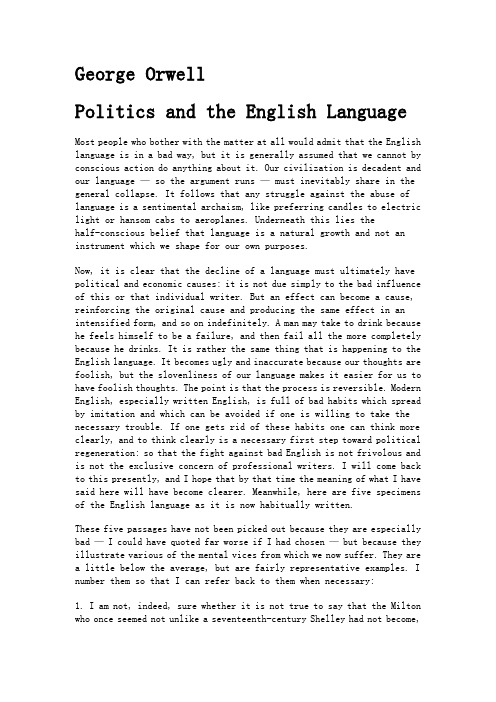
George OrwellPolitics and the English LanguageMost people who bother with the matter at all would admit that the English language is in a bad way, but it is generally assumed that we cannot by conscious action do anything about it. Our civilization is decadent and our language — so the argument runs — must inevitably share in the general collapse. It follows that any struggle against the abuse of language is a sentimental archaism, like preferring candles to electric light or hansom cabs to aeroplanes. Underneath this lies thehalf-conscious belief that language is a natural growth and not an instrument which we shape for our own purposes.Now, it is clear that the decline of a language must ultimately have political and economic causes: it is not due simply to the bad influence of this or that individual writer. But an effect can become a cause, reinforcing the original cause and producing the same effect in an intensified form, and so on indefinitely. A man may take to drink because he feels himself to be a failure, and then fail all the more completely because he drinks. It is rather the same thing that is happening to the English language. It becomes ugly and inaccurate because our thoughts are foolish, but the slovenliness of our language makes it easier for us to have foolish thoughts. The point is that the process is reversible. Modern English, especially written English, is full of bad habits which spread by imitation and which can be avoided if one is willing to take the necessary trouble. If one gets rid of these habits one can think more clearly, and to think clearly is a necessary first step toward political regeneration: so that the fight against bad English is not frivolous and is not the exclusive concern of professional writers. I will come back to this presently, and I hope that by that time the meaning of what I have said here will have become clearer. Meanwhile, here are five specimens of the English language as it is now habitually written.These five passages have not been picked out because they are especially bad — I could have quoted far worse if I had chosen — but because they illustrate various of the mental vices from which we now suffer. They are a little below the average, but are fairly representative examples. I number them so that I can refer back to them when necessary:1. I am not, indeed, sure whether it is not true to say that the Milton who once seemed not unlike a seventeenth-century Shelley had not become,out of an experience ever more bitter in each year, more alien [sic] to the founder of that Jesuit sect which nothing could induce him to tolerate.Professor Harold Laski (Essay in Freedom of Expression)2. Above all, we cannot play ducks and drakes with a native battery of idioms which prescribes egregious collocations of vocables as the Basic put up with for tolerate, or put at a loss for bewilder.Professor Lancelot Hogben (Interglossia)3. On the one side we have the free personality: by definition it is not neurotic, for it has neither conflict nor dream. Its desires, such as they are, are transparent, for they are just what institutional approval keeps in the forefront of consciousness; another institutional pattern would alter their number and intensity; there is little in them that is natural, irreducible, or culturally dangerous. But on the other side, the social bond itself is nothing but the mutual reflection of these self-secure integrities. Recall the definition of love. Is not this the very picture of a small academic? Where is there a place in this hall of mirrors for either personality or fraternity?Essay on psychology in Politics (New York)4. All the ‘best people’ from the gentlemen's clubs, and all the frantic fascist captains, united in common hatred of Socialism and bestial horror at the rising tide of the mass revolutionary movement, have turned to acts of provocation, to foul incendiarism, to medieval legends of poisoned wells, to legalize their own destruction of proletarian organizations, and rouse the agitated petty-bourgeoise to chauvinistic fervor on behalf of the fight against the revolutionary way out of the crisis.Communist pamphlet5. If a new spirit is to be infused into this old country, there is one thorny and contentious reform which must be tackled, and that is the humanization and galvanization of the B.B.C. Timidity here will bespeak canker and atrophy of the soul. The heart of Britain may be sound and of strong beat, for instance, but the British lion's roar at present is like that of Bottom in Shakespeare's A Midsummer Night's Dream— as gentle as any sucking dove. A virile new Britain cannot continue indefinitely to be traduced in the eyes or rather ears, of the world by the effete languors of Langham Place, brazenly masquerading as ‘standard English’. When the Voice of Britain is heard at nine o'clock, better far and infinitely less ludicrous to hear aitches honestly dropped than thepresent priggish, inflated, inhibited, school-ma'amish arch braying of blameless bashful mewing maidens!Letter in TribuneEach of these passages has faults of its own, but, quite apart from avoidable ugliness, two qualities are common to all of them. The first is staleness of imagery; the other is lack of precision. The writer either has a meaning and cannot express it, or he inadvertently says something else, or he is almost indifferent as to whether his words mean anything or not. This mixture of vagueness and sheer incompetence is the most marked characteristic of modern English prose, and especially of any kind of political writing. As soon as certain topics are raised, the concrete melts into the abstract and no one seems able to think of turns of speech that are not hackneyed: prose consists less and less of words chosen for the sake of their meaning, and more and more of phrases tacked together like the sections of a prefabricated hen-house. I list below, with notes and examples, various of the tricks by means of which the work of prose-construction is habitually dodged.DYING METAPHORS. A newly invented metaphor assists thought by evoking a visual image, while on the other hand a metaphor which is technically ‘dead’ (e. g. iron resolution) has in effect reverted to being an ordinary word and can generally be used without loss of vividness. But in between these two classes there is a huge dump of worn-out metaphors which have lost all evocative power and are merely used because they save people the trouble of inventing phrases for themselves. Examples are: Ring the changes on, take up the cudgel for, toe the line, ride roughshod over, stand shoulder to shoulder with, play into the hands of, no axe to grind, grist to the mill, fishing in troubled waters, on the order of the day, Achilles’ heel, swan song, hotbed. Many of these are used without knowledge of their meaning (what is a ‘rift’, for instance?), and incompatible metaphors are frequently mixed, a sure sign that the writer is not interested in what he is saying. Some metaphors now current have been twisted out of their original meaning without those who use them even being aware of the fact. For example, toe the line is sometimes written as tow the line. Another example is the hammer and the anvil, now always used with the implication that the anvil gets the worst of it. In real life it is always the anvil that breaks the hammer, never the other way about: a writer who stopped to think what he was saying would avoid perverting the original phrase.OPERATORS OR VERBAL FALSE LIMBS. These save the trouble of picking out appropriate verbs and nouns, and at the same time pad each sentence with extra syllables which give it an appearance of symmetry. Characteristicphrases are render inoperative, militate against, make contact with, be subjected to, give rise to, give grounds for, have the effect of, play a leading part (role) in, make itself felt, take effect, exhibit a tendency to, serve the purpose of, etc., etc. The keynote is the elimination of simple verbs. Instead of being a single word, such as break, stop, spoil, mend, kill,a verb becomes a phrase, made up of a noun or adjective tacked on to some general-purpose verb such as prove, serve, form, play, render. In addition, the passive voice is wherever possible used in preference to the active, and noun constructions are used instead of gerunds (by examination of instead of by examining). The range of verbs is further cut down by means of the -ize and de-formations, and the banal statements are given an appearance of profundity by means of the not un- formation. Simple conjunctions and prepositions are replaced by such phrases as with respect to, having regard to, the fact that, by dint of, in view of, in the interests of, on the hypothesis that; and the ends of sentences are saved by anticlimax by such resounding commonplaces as greatly to be desired, cannot be left out of account, a development to be expected in the near future, deserving of serious consideration, brought to a satisfactory conclusion, and so on and so forth.PRETENTIOUS DICTION. Words like phenomenon, element, individual (as noun), objective, categorical, effective, virtual, basic, primary, promote, constitute, exhibit, exploit, utilize, eliminate, liquidate,are used to dress up a simple statement and give an air of scientific impartiality to biased judgements. Adjectives like epoch-making, epic, historic, unforgettable, triumphant, age-old, inevitable, inexorable, veritable, are used to dignify the sordid process of international politics, while writing that aims at glorifying war usually takes on an archaic colour, its characteristic words being: realm, throne, chariot, mailed fist, trident, sword, shield, buckler, banner, jackboot, clarion.Foreign words and expressions such as cul de sac, ancien regime, deus ex machina, mutatis mutandis, status quo, gleichschaltung, weltanschauung, are used to give an air of culture and elegance. Except for the useful abbreviations i.e., e. g. and etc.,there is no real need for any of the hundreds of foreign phrases now current in the English language. Bad writers, and especially scientific, political, and sociological writers, are nearly always haunted by the notion that Latin or Greek words are grander than Saxon ones, and unnecessary words like expedite, ameliorate, predict, extraneous, deracinated, clandestine, subaqueous,and hundreds of others constantly gain ground from their Anglo-Saxon numbers(1). The jargon peculiar to Marxist writing (hyena, hangman, cannibal, petty bourgeois, these gentry, lackey, flunkey, mad dog, White Guard, etc.) consists largely of words translated from Russian, German, or French; but the normal way of coining a new word is to use Latin or Greek root with theappropriate affix and, where necessary, the size formation. It is often easier to make up words of this kind (deregionalize, impermissible, extramarital, non-fragmentary and so forth) than to think up the English words that will cover one's meaning. The result, in general, is an increase in slovenliness and vagueness.MEANINGLESS WORDS. In certain kinds of writing, particularly in art criticism and literary criticism, it is normal to come across long passages which are almost completely lacking in meaning(2). Words like romantic, plastic, values, human, dead, sentimental, natural, vitality, as used in art criticism, are strictly meaningless, in the sense that they not only do not point to any discoverable object, but are hardly ever expected to do so by the reader. When one critic wri tes, ‘The outstanding feature of Mr. X's work is its living quality’, while another writes, ‘The immediately striking thing about Mr. X's work is its peculiar deadness’, the reader accepts this as a simple difference opinion. If words like black and white were involved, instead of the jargon words dead and living, he would see at once that language was being used in an improper way. Many political words are similarly abused. The word Fascism has now no meaning except in so far as it signifies ‘something not desirable’. The words democracy, socialism, freedom, patriotic, realistic, justice have each of them several different meanings which cannot be reconciled with one another. In the case of a word like democracy, not only is there no agreed definition, but the attempt to make one is resisted from all sides. It is almost universally felt that when we call a country democratic we are praising it: consequently the defenders of every kind of regime claim that it is a democracy, and fear that they might have to stop using that word if it were tied down to any one meaning. Words of this kind are often used in a consciously dishonest way. That is, the person who uses them has his own private definition, but allows his hearer to think he means something quite different. Statements like Marshal Petain was a true patriot, The Soviet press is the freest in the world, The Catholic Church is opposed to persecution,are almost always made with intent to deceive. Other words used in variable meanings, in most cases more or less dishonestly, are: class, totalitarian, science, progressive, reactionary, bourgeois, equality.Now that I have made this catalogue of swindles and perversions, let me give another example of the kind of writing that they lead to. This time it must of its nature be an imaginary one. I am going to translate a passage of good English into modern English of the worst sort. Here is a well-known verse from Ecclesiastes:I returned and saw under the sun, that the race is not to the swift, nor the battle to the strong, neither yet bread to the wise, nor yet richesto men of understanding, nor yet favour to men of skill; but time and chance happeneth to them all.Here it is in modern English:Objective considerations of contemporary phenomena compel the conclusion that success or failure in competitive activities exhibits no tendency to be commensurate with innate capacity, but that a considerable element of the unpredictable must invariably be taken into account.This is a parody, but not a very gross one.。
英语政治 专业课
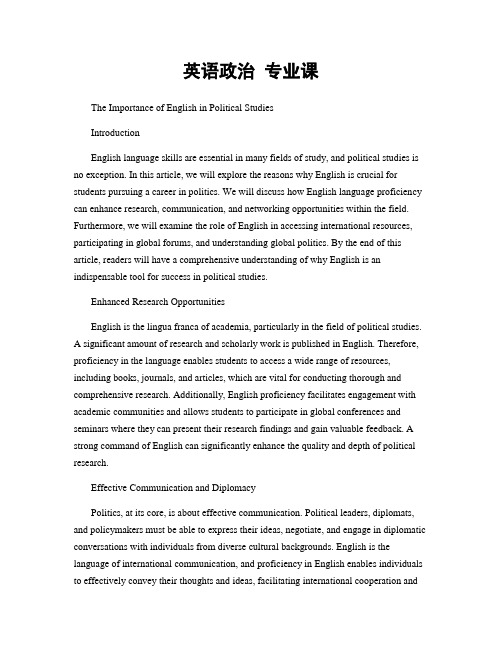
英语政治专业课The Importance of English in Political StudiesIntroductionEnglish language skills are essential in many fields of study, and political studies is no exception. In this article, we will explore the reasons why English is crucial for students pursuing a career in politics. We will discuss how English language proficiency can enhance research, communication, and networking opportunities within the field. Furthermore, we will examine the role of English in accessing international resources, participating in global forums, and understanding global politics. By the end of this article, readers will have a comprehensive understanding of why English is an indispensable tool for success in political studies.Enhanced Research OpportunitiesEnglish is the lingua franca of academia, particularly in the field of political studies.A significant amount of research and scholarly work is published in English. Therefore, proficiency in the language enables students to access a wide range of resources, including books, journals, and articles, which are vital for conducting thorough and comprehensive research. Additionally, English proficiency facilitates engagement with academic communities and allows students to participate in global conferences and seminars where they can present their research findings and gain valuable feedback. A strong command of English can significantly enhance the quality and depth of political research.Effective Communication and DiplomacyPolitics, at its core, is about effective communication. Political leaders, diplomats, and policymakers must be able to express their ideas, negotiate, and engage in diplomatic conversations with individuals from diverse cultural backgrounds. English is the language of international communication, and proficiency in English enables individuals to effectively convey their thoughts and ideas, facilitating international cooperation andunderstanding. Moreover, English language skills provide political professionals with the ability to engage in global debates and discussions, thereby broadening their perspectives and allowing them to contribute meaningfully to the global political discourse.Access to International ResourcesIn the digital age, English proficiency is essential for accessing a vast array of international resources. English is the dominant language of the internet, and most scholarly databases, online journals, and research materials are available in English. By having strong English skills, political studies students can access a wealth of information, allowing them to stay updated on the latest political developments and theories. This access to international resources helps students gain a broader and more nuanced understanding of global politics, enabling them to make informed and well-rounded analyses and evaluations.Participation in Global Forums and OrganizationsParticipating in global forums and organizations is an important aspect of political studies. English proficiency is crucial for engaging with international political institutions, such as the United Nations, the European Union, and various non-governmental organizations. These organizations use English as their primary language of communication, and being able to understand, analyze, and contribute to these forums is paramount for political studies students. English proficiency opens doors to internship opportunities, research collaborations, and networking with professionals from around the world, all of which are invaluable for students aspiring to have a successful career in politics.Understanding Global PoliticsEnglish proficiency is not only beneficial for engaging in global politics, but it is also crucial for understanding and analyzing global political dynamics. The English language provides students with access to a wide range of political literature, including political theory, international relations, and comparative politics. By studying political texts in English, students can gain insights into different political ideologies, systems, andpolicies, helping them develop a well-rounded understanding of the global political landscape. English language skills, combined with political studies, provide students with the necessary tools to critically analyze and evaluate global political phenomena.ConclusionEnglish language proficiency is of utmost importance for students pursuing political studies. It enhances research opportunities, facilitates effective communication and diplomacy, and provides access to international resources. English proficiency also enables students to participate in global forums and organizations, fostering networking and collaboration with professionals from around the world. Furthermore, English skills are vital for understanding and analyzing global politics, as it grants access to a wealth of political literature and theories. As such, developing strong English language skills is an essential investment for aspiring politicians and political scholars.。
政治与英语
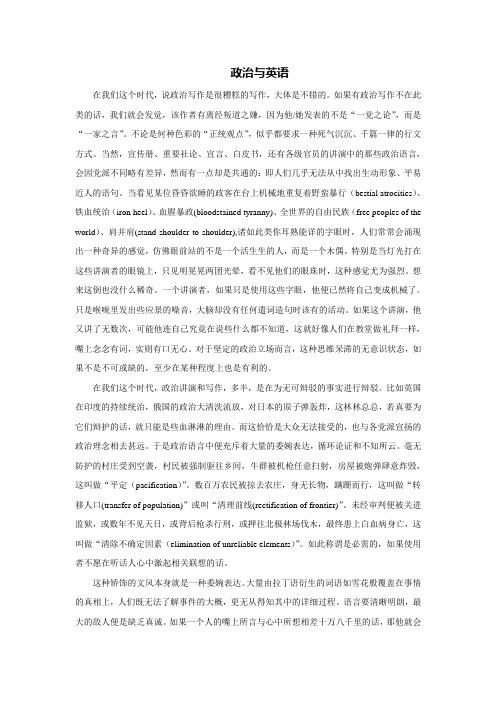
政治与英语在我们这个时代,说政治写作是很糟糕的写作,大体是不错的。
如果有政治写作不在此类的话,我们就会发觉,该作者有离经叛道之嫌,因为他/她发表的不是“一党之论”,而是“一家之言”。
不论是何种色彩的“正统观点”,似乎都要求一种死气沉沉、千篇一律的行文方式。
当然,宣传册、重要社论、宣言、白皮书,还有各级官员的讲演中的那些政治语言,会因党派不同略有差异,然而有一点却是共通的:即人们几乎无法从中找出生动形象、平易近人的语句。
当看见某位昏昏欲睡的政客在台上机械地重复着野蛮暴行(bestial atrocities)、铁血统治(iron heel)、血腥暴政(bloodstained tyranny)、全世界的自由民族(free peoples of the world)、肩并肩(stand shoulder to shoulder),诸如此类你耳熟能详的字眼时,人们常常会涌现出一种奇异的感觉,仿佛眼前站的不是一个活生生的人,而是一个木偶。
特别是当灯光打在这些讲演者的眼镜上,只见明晃晃两团光晕,看不见他们的眼珠时,这种感觉尤为强烈。
想来这倒也没什么稀奇。
一个讲演者,如果只是使用这些字眼,他便已然将自己变成机械了。
只是喉咙里发出些应景的噪音,大脑却没有任何遣词造句时该有的活动。
如果这个讲演,他又讲了无数次,可能他连自己究竟在说些什么都不知道,这就好像人们在教堂做礼拜一样,嘴上念念有词,实则有口无心。
对于坚定的政治立场而言,这种思维呆滞的无意识状态,如果不是不可或缺的,至少在某种程度上也是有利的。
在我们这个时代,政治讲演和写作,多半,是在为无可辩驳的事实进行辩驳。
比如英国在印度的持续统治,俄国的政治大清洗流放,对日本的原子弹轰炸,这林林总总,若真要为它们辩护的话,就只能是些血淋淋的理由。
而这恰恰是大众无法接受的,也与各党派宣扬的政治理念相去甚远。
于是政治语言中便充斥着大量的委婉表达,循环论证和不知所云。
毫无防护的村庄受到空袭,村民被强制驱往乡间,牛群被机枪任意扫射,房屋被炮弹肆意炸毁,这叫做“平定(pacification)”。
- 1、下载文档前请自行甄别文档内容的完整性,平台不提供额外的编辑、内容补充、找答案等附加服务。
- 2、"仅部分预览"的文档,不可在线预览部分如存在完整性等问题,可反馈申请退款(可完整预览的文档不适用该条件!)。
- 3、如文档侵犯您的权益,请联系客服反馈,我们会尽快为您处理(人工客服工作时间:9:00-18:30)。
George OrwellPolitics and the English LanguageMost people who bother with the matter at all would admit that the English language is in a bad way, but it is generally assumed that we cannot by conscious action do anything about it. Our civilization is decadent and our language — so the argument runs — must inevitably share in the general collapse. It follows that any struggle against the abuse of language is a sentimental archaism, like preferring candles to electric light or hansom cabs to aeroplanes. Underneath this lies thehalf-conscious belief that language is a natural growth and not an instrument which we shape for our own purposes.Now, it is clear that the decline of a language must ultimately have political and economic causes: it is not due simply to the bad influence of this or that individual writer. But an effect can become a cause, reinforcing the original cause and producing the same effect in an intensified form, and so on indefinitely. A man may take to drink because he feels himself to be a failure, and then fail all the more completely because he drinks. It is rather the same thing that is happening to the English language. It becomes ugly and inaccurate because our thoughts are foolish, but the slovenliness of our language makes it easier for us to have foolish thoughts. The point is that the process is reversible. Modern English, especially written English, is full of bad habits which spread by imitation and which can be avoided if one is willing to take the necessary trouble. If one gets rid of these habits one can think more clearly, and to think clearly is a necessary first step toward political regeneration: so that the fight against bad English is not frivolous and is not the exclusive concern of professional writers. I will come back to this presently, and I hope that by that time the meaning of what I have said here will have become clearer. Meanwhile, here are five specimens of the English language as it is now habitually written.These five passages have not been picked out because they are especially bad — I could have quoted far worse if I had chosen — but because they illustrate various of the mental vices from which we now suffer. They are a little below the average, but are fairly representative examples. I number them so that I can refer back to them when necessary:1. I am not, indeed, sure whether it is not true to say that the Milton who once seemed not unlike a seventeenth-century Shelley had not become,out of an experience ever more bitter in each year, more alien [sic] to the founder of that Jesuit sect which nothing could induce him to tolerate.Professor Harold Laski (Essay in Freedom of Expression)2. Above all, we cannot play ducks and drakes with a native battery of idioms which prescribes egregious collocations of vocables as the Basic put up with for tolerate, or put at a loss for bewilder.Professor Lancelot Hogben (Interglossia)3. On the one side we have the free personality: by definition it is not neurotic, for it has neither conflict nor dream. Its desires, such as they are, are transparent, for they are just what institutional approval keeps in the forefront of consciousness; another institutional pattern would alter their number and intensity; there is little in them that is natural, irreducible, or culturally dangerous. But on the other side, the social bond itself is nothing but the mutual reflection of these self-secure integrities. Recall the definition of love. Is not this the very picture of a small academic? Where is there a place in this hall of mirrors for either personality or fraternity?Essay on psychology in Politics (New York)4. All the ‘best people’ from the gentlemen's clubs, and all the frantic fascist captains, united in common hatred of Socialism and bestial horror at the rising tide of the mass revolutionary movement, have turned to acts of provocation, to foul incendiarism, to medieval legends of poisoned wells, to legalize their own destruction of proletarian organizations, and rouse the agitated petty-bourgeoise to chauvinistic fervor on behalf of the fight against the revolutionary way out of the crisis.Communist pamphlet5. If a new spirit is to be infused into this old country, there is one thorny and contentious reform which must be tackled, and that is the humanization and galvanization of the B.B.C. Timidity here will bespeak canker and atrophy of the soul. The heart of Britain may be sound and of strong beat, for instance, but the British lion's roar at present is like that of Bottom in Shakespeare's A Midsummer Night's Dream— as gentle as any sucking dove. A virile new Britain cannot continue indefinitely to be traduced in the eyes or rather ears, of the world by the effete languors of Langham Place, brazenly masquerading as ‘standard English’. When the Voice of Britain is heard at nine o'clock, better far and infinitely less ludicrous to hear aitches honestly dropped than thepresent priggish, inflated, inhibited, school-ma'amish arch braying of blameless bashful mewing maidens!Letter in TribuneEach of these passages has faults of its own, but, quite apart from avoidable ugliness, two qualities are common to all of them. The first is staleness of imagery; the other is lack of precision. The writer either has a meaning and cannot express it, or he inadvertently says something else, or he is almost indifferent as to whether his words mean anything or not. This mixture of vagueness and sheer incompetence is the most marked characteristic of modern English prose, and especially of any kind of political writing. As soon as certain topics are raised, the concrete melts into the abstract and no one seems able to think of turns of speech that are not hackneyed: prose consists less and less of words chosen for the sake of their meaning, and more and more of phrases tacked together like the sections of a prefabricated hen-house. I list below, with notes and examples, various of the tricks by means of which the work of prose-construction is habitually dodged.DYING METAPHORS. A newly invented metaphor assists thought by evoking a visual image, while on the other hand a metaphor which is technically ‘dead’ (e. g. iron resolution) has in effect reverted to being an ordinary word and can generally be used without loss of vividness. But in between these two classes there is a huge dump of worn-out metaphors which have lost all evocative power and are merely used because they save people the trouble of inventing phrases for themselves. Examples are: Ring the changes on, take up the cudgel for, toe the line, ride roughshod over, stand shoulder to shoulder with, play into the hands of, no axe to grind, grist to the mill, fishing in troubled waters, on the order of the day, Achilles’ heel, swan song, hotbed. Many of these are used without knowledge of their meaning (what is a ‘rift’, for instance?), and incompatible metaphors are frequently mixed, a sure sign that the writer is not interested in what he is saying. Some metaphors now current have been twisted out of their original meaning without those who use them even being aware of the fact. For example, toe the line is sometimes written as tow the line. Another example is the hammer and the anvil, now always used with the implication that the anvil gets the worst of it. In real life it is always the anvil that breaks the hammer, never the other way about: a writer who stopped to think what he was saying would avoid perverting the original phrase.OPERATORS OR VERBAL FALSE LIMBS. These save the trouble of picking out appropriate verbs and nouns, and at the same time pad each sentence with extra syllables which give it an appearance of symmetry. Characteristicphrases are render inoperative, militate against, make contact with, be subjected to, give rise to, give grounds for, have the effect of, play a leading part (role) in, make itself felt, take effect, exhibit a tendency to, serve the purpose of, etc., etc. The keynote is the elimination of simple verbs. Instead of being a single word, such as break, stop, spoil, mend, kill,a verb becomes a phrase, made up of a noun or adjective tacked on to some general-purpose verb such as prove, serve, form, play, render. In addition, the passive voice is wherever possible used in preference to the active, and noun constructions are used instead of gerunds (by examination of instead of by examining). The range of verbs is further cut down by means of the -ize and de-formations, and the banal statements are given an appearance of profundity by means of the not un- formation. Simple conjunctions and prepositions are replaced by such phrases as with respect to, having regard to, the fact that, by dint of, in view of, in the interests of, on the hypothesis that; and the ends of sentences are saved by anticlimax by such resounding commonplaces as greatly to be desired, cannot be left out of account, a development to be expected in the near future, deserving of serious consideration, brought to a satisfactory conclusion, and so on and so forth.PRETENTIOUS DICTION. Words like phenomenon, element, individual (as noun), objective, categorical, effective, virtual, basic, primary, promote, constitute, exhibit, exploit, utilize, eliminate, liquidate,are used to dress up a simple statement and give an air of scientific impartiality to biased judgements. Adjectives like epoch-making, epic, historic, unforgettable, triumphant, age-old, inevitable, inexorable, veritable, are used to dignify the sordid process of international politics, while writing that aims at glorifying war usually takes on an archaic colour, its characteristic words being: realm, throne, chariot, mailed fist, trident, sword, shield, buckler, banner, jackboot, clarion.Foreign words and expressions such as cul de sac, ancien regime, deus ex machina, mutatis mutandis, status quo, gleichschaltung, weltanschauung, are used to give an air of culture and elegance. Except for the useful abbreviations i.e., e. g. and etc.,there is no real need for any of the hundreds of foreign phrases now current in the English language. Bad writers, and especially scientific, political, and sociological writers, are nearly always haunted by the notion that Latin or Greek words are grander than Saxon ones, and unnecessary words like expedite, ameliorate, predict, extraneous, deracinated, clandestine, subaqueous,and hundreds of others constantly gain ground from their Anglo-Saxon numbers(1). The jargon peculiar to Marxist writing (hyena, hangman, cannibal, petty bourgeois, these gentry, lackey, flunkey, mad dog, White Guard, etc.) consists largely of words translated from Russian, German, or French; but the normal way of coining a new word is to use Latin or Greek root with theappropriate affix and, where necessary, the size formation. It is often easier to make up words of this kind (deregionalize, impermissible, extramarital, non-fragmentary and so forth) than to think up the English words that will cover one's meaning. The result, in general, is an increase in slovenliness and vagueness.MEANINGLESS WORDS. In certain kinds of writing, particularly in art criticism and literary criticism, it is normal to come across long passages which are almost completely lacking in meaning(2). Words like romantic, plastic, values, human, dead, sentimental, natural, vitality, as used in art criticism, are strictly meaningless, in the sense that they not only do not point to any discoverable object, but are hardly ever expected to do so by the reader. When one critic wri tes, ‘The outstanding feature of Mr. X's work is its living quality’, while another writes, ‘The immediately striking thing about Mr. X's work is its peculiar deadness’, the reader accepts this as a simple difference opinion. If words like black and white were involved, instead of the jargon words dead and living, he would see at once that language was being used in an improper way. Many political words are similarly abused. The word Fascism has now no meaning except in so far as it signifies ‘something not desirable’. The words democracy, socialism, freedom, patriotic, realistic, justice have each of them several different meanings which cannot be reconciled with one another. In the case of a word like democracy, not only is there no agreed definition, but the attempt to make one is resisted from all sides. It is almost universally felt that when we call a country democratic we are praising it: consequently the defenders of every kind of regime claim that it is a democracy, and fear that they might have to stop using that word if it were tied down to any one meaning. Words of this kind are often used in a consciously dishonest way. That is, the person who uses them has his own private definition, but allows his hearer to think he means something quite different. Statements like Marshal Petain was a true patriot, The Soviet press is the freest in the world, The Catholic Church is opposed to persecution,are almost always made with intent to deceive. Other words used in variable meanings, in most cases more or less dishonestly, are: class, totalitarian, science, progressive, reactionary, bourgeois, equality.Now that I have made this catalogue of swindles and perversions, let me give another example of the kind of writing that they lead to. This time it must of its nature be an imaginary one. I am going to translate a passage of good English into modern English of the worst sort. Here is a well-known verse from Ecclesiastes:I returned and saw under the sun, that the race is not to the swift, nor the battle to the strong, neither yet bread to the wise, nor yet richesto men of understanding, nor yet favour to men of skill; but time and chance happeneth to them all.Here it is in modern English:Objective considerations of contemporary phenomena compel the conclusion that success or failure in competitive activities exhibits no tendency to be commensurate with innate capacity, but that a considerable element of the unpredictable must invariably be taken into account.This is a parody, but not a very gross one.。
